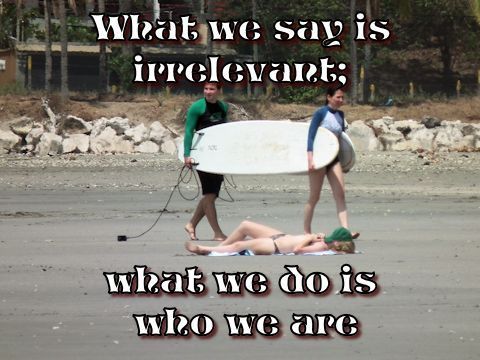What we say is irrelevant; what we do is who we are
What we say is irrelevant; what we do is who we are — talking a good show is meaningless.
In This Moment
In Buffalo NY today, on the way to Chicago and points west. Will be at The Haven August 2. Look us up if you are in the vacinity!
A reminder that we’re now also writing a travel blog called, "Simple Zen Travellers." We’ll share tools and methods for turning your travel into an adventure in self-knowing. You can sign up at:
http://www.simplezenguy.com/travellers/

This semi-lighthearted manifesto consists of ideas that “hook” into each other. And one of those ideas is this: “inside” and “outside” are inexorably linked. I would go so far as to say that I understand another “only” based upon their behaviour.
Here are a few examples:
Rosa Parks: I would assume that her internal theatre, back in the 60s, was "Systemic racism is simply wrong — indefensible." Most readers of this blog would agree with this. But here’s the thing. So what?
Her belief is a "warm, fuzzy," and we liberals nod sagely in agreement. Had she only thought her thought, we’d all be going "Rosa who?"
Her thought, however, coupled with her decisive action, changed things, massively.
How? She sat down in the front of a bus, and quietly refused to move. She willingly took the pressure, the beat-down, etc. At that moment, her inside and outside was in harmony.
And still, no external change.
Then, the word got out (imagine this happening in a world without Twitter, etc.) … somehow, and got picked up by the media, and Rosa’s action stimulated the hearts of multitudes of Freedom Riders, who went South and sat down, and in this way, began to break the back of government sponsored racism in the US.
Buddha, Jesus, Muhammad — died with a handful of true followers. Spoke, and spoke, and spoke to thousands, yet the movement came from the nitty-gritty work of the "disciples," who turned the personal, through their actions (and often, martyrdom) into a fire.
On the other hand, I think of how many people I know who go no further than the talking, lecturing, and pronouncing.
Meditators who only meditate when things are going well. Communicators who only use the model in the good times, reverting back to lectures and brow-beating when confronted. People who want an open body (or relationship,) yet who tighten up and shut down at the first hint of intimacy.
Therefore, we’ve gotta ask,
Why are people so willing to talk a good show,
and so reluctant to actually live it?
I won’t spend a lot of time on this, as I talk a lot about how we live out the dramas of our lives. What did occur to me was the "churchly" idea of sins of omission and commission. We’ll drop the sins part (as there really is no such thing) and just look at the variables.
Omissions are the things we choose not to do, even though we know that the omitted behaviour would be in our best interest.
As usual you’ll notice that I’m not talking about the best interest of others. It’s impossible to figure our life out by focussing on the wants and needs of others. Simply put, "the needs of others" is an endless and slippery slope. The problem: where does one draw the line? And how many people qualify as having more important or pressing needs than my own? And what do I do when all of those needs conflict?
Back to omissions
If I know, for example, that behaving and communicating in a certain way means that I am heard and acknowledged, and then, knowing that, if I willfully choose not to communicate or behave in that way, I am "guilty" of omission. It doesn’t matter if I preach or teach elegant communication and behaviour.
If my words don’t match my life behaviours, I am a hypocrite.
Commissions are the things we choose to do, even though we know that the enacted behaviour is not in our best interest.
If I know that a certain behaviour, attitude or way of being consistently gets me lousy results and/or "makes me" feel like crap, and if I continue to engage in that behaviour (even if I only do it irregularly) then I am "guilty" of commission.
No matter how strongly I protest my innocence, ("The debbil made me do it!") or my history ("All the women in my family are like this!") or my clumsiness ("I just slipped. After all, I’m human.") — no matter what I believe others are doing, ("Anyone would have gotten upset under this situation,") I am not innocent.
If I make excuses for my the way I choose to behave, I am a hypocrite.
Now, I get asked, a lot, how to get this once and for all. And I reply, "Forget it! This is a lifetime task. One time and one time and one time. "
When I say, "get it," I mean, "get it this time." It’s actually a good thing that we don’t "get it" once and for all. It’s much easier to simply deal with the next situation, and the next, than wait (and wait, and wait) for just the right moment to fix every aspect of your life.
I guess, for me, the answer is endless consistency. The more carefully I can address my issues, experience by experience, the better I get to know myself, and the more I can appreciate the principle of discipline. I am thus consistently disciplined in my behaviour, while being flexible in my beliefs.
Perhaps the way out is to give up on excuses, confusions and self-doubts.
I know. Big task. But most people I talk with show amazing competencies in several aspects of their lives, and then, for example, suck at interpersonal stuff. The competencies match what is needed in the interpersonal arena, but the excuses, confusions and self-doubts are created and activated in an attempt to stay stuck.
Often, this is because the fear of change outweighs the desire to stop the foolishness. Or, it’s an egoic, "I’ll be damned if I’m going to change if everyone else gets to stay the same" thing.
We get past this sticking place by directly and firmly dealing with the only thing we can deal with – our thinking and behaviours.
As we feel the excuses, confusions and self-doubts arising, there is nothing to do but to notice, and in the noticing, make another choice. It’s not about eliminating the excuses, confusions and self-doubts first, then changing the behaviour. That’s futile.
It’s simply about acknowledging the excuses, confusions and self-doubts, gently letting them go, and then acting in a clear and concise way.
I’m still doing Bodywork for friends. It’s now a space thing. Yesterday, one neat young woman had some shoulder issues, as well as self-described confusions about how to live her life passionately. She’s kind of waiting for things to just work out.
[image error]
I did a lot of work on her shoulders, and then moved to the small of her back, butt, and root chakra / genital area. She stayed present, breathed, opened. At one point I looked at her sacral area. I hadn’t worked there at all.
The skin was bright red. (I’m sad I didn’t have a camera handy.)
I commented, and she said, "It’s really warm." She then mentioned how, this time, she stayed present for the entire Bodywork session — no wool-gathering, shutting down, closing up. And she was then able to feel her passion (for life — located, you guessed it, at the sacrum.)
This is integrity — staying open, feeling, acting, not shutting down or thinking too much. Inside, matching outside. And just being on fire.
This week, ask a few intimate friends about your ability to actually live what your mouth is promoting. Look at your level of frustration. Ask yourself about your omissions and commissions. Then, one time, match deeds to words.
I think you’ll like the result.
Make Contact!
So, how does this week’s article sit with you? What questions do you have? Go to the top of the page, and click on the article title, and leave a comment or question!
Weekend Residentials
Darbella and I can help you to find a new, vibrant, rich path. Our Weekend Residential program is just you and us — we will work with you, helping you
to become the change you want to see.
Read about it here:
Weekend Residentials
The post What we say is irrelevant; what we do is who we are appeared first on The Pathless Path.



